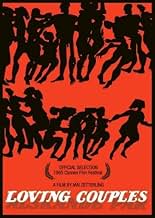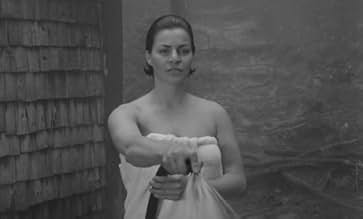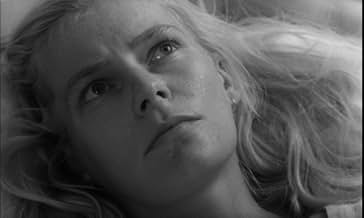AVALIAÇÃO DA IMDb
6,6/10
874
SUA AVALIAÇÃO
Adicionar um enredo no seu idiomaThree expectant mothers think back over their sex lives.Three expectant mothers think back over their sex lives.Three expectant mothers think back over their sex lives.
- Direção
- Roteiristas
- Artistas
- Prêmios
- 1 indicação no total
Jan-Erik Lindqvist
- Peter von Pahlen
- (as Jan-Eric Lindquist)
- Direção
- Roteiristas
- Elenco e equipe completos
- Produção, bilheteria e muito mais no IMDbPro
Avaliações em destaque
Both in the ambiance and in its women's themes in this movie you can see unequivocally Bergman's influences. In particular It recalls Bergman's SECRETS OF WOMEN (1952)for the cast ( It's almost the same!)and for its episodic structure. The psychological search on women universe is another important link.
Anyway, although Mai Zetterling had abused it in her movies, I think that the flashback use is very interesting in this movie. It becomes, with the editing help, a concrete tragic matter and not only a way to tell the story. I give it a 6.
Anyway, although Mai Zetterling had abused it in her movies, I think that the flashback use is very interesting in this movie. It becomes, with the editing help, a concrete tragic matter and not only a way to tell the story. I give it a 6.
Three women at a lying-in hospital reflect on how they got there in Mai Zetterling's first feature as a director.
I was surprised at how Bergmanesque this movie was, although not as overtly cerebral. Of course a good deal of that can be attributed to the presence of Harriet Anderson, one of Bergman's frequent leading ladies, and Sven Nyquist being the cinematographer; but while it looks like a duck and walks like a duck, it doesn't quack like a duck. Instead of Bergman's meditation on keeping society going in a G*dless universe, it considers woman's place in a society run for the benefit and pleasure of its men; and the continuation of society depends more on popping out babies, a process which the women don't have on their minds when they get pregnant. Bergman may mourn the absence of G*d, but to Zetterling, He's irrelevant.
I was surprised at how Bergmanesque this movie was, although not as overtly cerebral. Of course a good deal of that can be attributed to the presence of Harriet Anderson, one of Bergman's frequent leading ladies, and Sven Nyquist being the cinematographer; but while it looks like a duck and walks like a duck, it doesn't quack like a duck. Instead of Bergman's meditation on keeping society going in a G*dless universe, it considers woman's place in a society run for the benefit and pleasure of its men; and the continuation of society depends more on popping out babies, a process which the women don't have on their minds when they get pregnant. Bergman may mourn the absence of G*d, but to Zetterling, He's irrelevant.
The story of three women from different, but related, backgrounds about to give birth in a hospital in Sweden around the start of World War I.
Via inter-cut flashbacks we are shown how they ended up in their situation.
Often beautiful Sven Nykvist photo and many great directorial flourishes from director Mai Zetterling makes this a treat.
The parallels with Bergman are many. For instance, apart from Mr. Nykvist, many of the actors have appeared in various Bergman productions, the themes dealt with here are very similar to various Bergman films, and so on. Dissimilar enough to be interesting though.
Has some very interesting scenes that I would imagine were very controversial at the time, such as two gay men frolicking and getting mock-married in a church, a graphic shot of a baby's birth, some female nudity, a lesbian kiss, etc..
Via inter-cut flashbacks we are shown how they ended up in their situation.
Often beautiful Sven Nykvist photo and many great directorial flourishes from director Mai Zetterling makes this a treat.
The parallels with Bergman are many. For instance, apart from Mr. Nykvist, many of the actors have appeared in various Bergman productions, the themes dealt with here are very similar to various Bergman films, and so on. Dissimilar enough to be interesting though.
Has some very interesting scenes that I would imagine were very controversial at the time, such as two gay men frolicking and getting mock-married in a church, a graphic shot of a baby's birth, some female nudity, a lesbian kiss, etc..
A cynical view of marriage and love relationships in Sweden in 1914. In a totally patriarchal society women are left to use sex and motherhood as a form of power, which effectively gives them a substantial slice of influence but does not bring them any happiness.
If women's destiny is to seek love, as one of the characters says, we don't see it at all in this film. It is forbidden to them by the established social model.
Due to Nykvist's beautiful cinematography and a lot of excellent actors that we are used to see in Bergman's movies, this would even seem, at first glance, to be a film by this director. But, unlike Bergman, who always imprints a strong ethical sense on his stories, here we are at the opposite end of the spectrum, a complete cynicism when it comes to human and social values. This is a real world, a dog world and not a principled world.
A pleasant surprise.
If women's destiny is to seek love, as one of the characters says, we don't see it at all in this film. It is forbidden to them by the established social model.
Due to Nykvist's beautiful cinematography and a lot of excellent actors that we are used to see in Bergman's movies, this would even seem, at first glance, to be a film by this director. But, unlike Bergman, who always imprints a strong ethical sense on his stories, here we are at the opposite end of the spectrum, a complete cynicism when it comes to human and social values. This is a real world, a dog world and not a principled world.
A pleasant surprise.
There is no doubt that the Swedish actress Mai Zetterling, in her feature-length directing debut, had Ingmar Bergman in her mind: the cast is full of Bergman veterans, the cinematography is by the emblematic Bergman collaborator Sven Nykvist, and the whole style of the movie is modelled on her famous compatriot. Technically, the imitation is accurate: the film is well-made, the acting is fine, and I liked how Zetterling contrasted three different types of women - one happy all the time, one never happy, one somewhere in between. But the stories are too long and meandering, and for a movie so heavily dependent on flashbacks (about 80% of the running time), the flashbacks themselves are not especially revealing. **1/2 out of 4.
Você sabia?
- CuriosidadesMai Zetterling's directorial debut.
- Citações
Dr. Jacob Lewin: I can't do much unless you take your pants off and lie down.
- ConexõesFeatured in Vielleicht bin ich wirklich eine Zauberin (1989)
- Trilhas sonorasBagni di Lucca
Composed by Giuseppe Manente (1903)
Principais escolhas
Faça login para avaliar e ver a lista de recomendações personalizadas
- How long is Loving Couples?Fornecido pela Alexa
Detalhes
- Tempo de duração1 hora 58 minutos
- Cor
- Mixagem de som
- Proporção
- 1.66 : 1
Contribua para esta página
Sugerir uma alteração ou adicionar conteúdo ausente

Principal brecha
By what name was Casais Amorosos (1964) officially released in India in English?
Responda




































